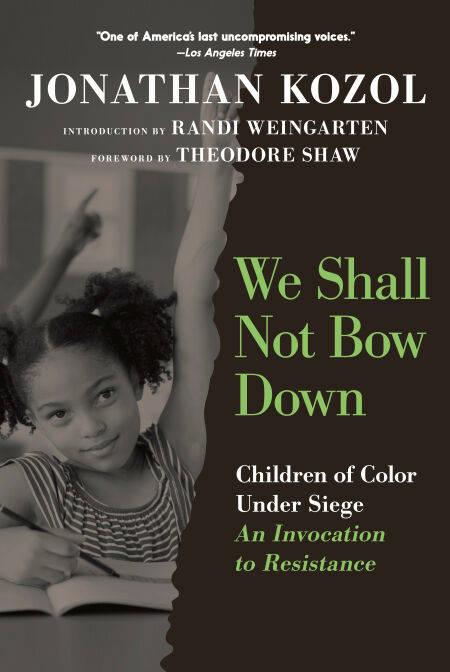
- Afhalen na 1 uur in een winkel met voorraad
- Gratis thuislevering in België vanaf € 30
- Ruim aanbod met 7 miljoen producten
- Afhalen na 1 uur in een winkel met voorraad
- Gratis thuislevering in België vanaf € 30
- Ruim aanbod met 7 miljoen producten
Zoeken
We Shall Not Bow Down E-BOOK
Children of Color Under Siege: An Invocation to Resistance
Jonathan Kozol
E-book | Engels
€ 11,82
+ 11 punten
Uitvoering
Omschrijving
An eloquent and passionate call for educational transformation.
In the culminating work of his career, groundbreaking educator Jonathan Kozol goes back into urban schools, where racial isolation is at the highest level since he became a teacher and is now compounded by a new regime of punitive instruction and coercive uniformity that is deemed to be appropriate for children who are said to be incapable of learning in more democratic ways, like children in more privileged communities. Kozol believes it’s well past time to batter down the walls between two separate worlds of education and to make good, at long last, on the “promissory note” that Dr. Martin Luther King Jr. described on the steps of the Lincoln Memorial in 1963.
We Shall Not Bow Down takes aim directly at the disparate agenda that denies Black and Latino children the right to ask discerning questions about a system that places them in toxic sequestration and substitutes draconian penalties and a constant fear of failure for anything resembling healthy motivation. This extreme degree of indoctrinational and authoritarian instruction, Kozol writes, has robbed too many of our children of the power to think independently at a time when it is desperately needed in the face of an administration that is threatening the very essences of democracy.
We Shall Not Bow Down is a significantly revised and expanded version of Kozol's book, An End to Inequality, which the New York Times called “An unapologetic cri de coeur about the shortcomings of the schools that serve poor Black and Hispanic children, and thus, the moral failure of the nation to end the inequality [Kozol] has documented for decades.”
At this moment of political retrenchment, with Trump and Musk riding high, it may seem an impossible dream, but Kozol argues convincingly that it’s a goal worth fighting for.
In the culminating work of his career, groundbreaking educator Jonathan Kozol goes back into urban schools, where racial isolation is at the highest level since he became a teacher and is now compounded by a new regime of punitive instruction and coercive uniformity that is deemed to be appropriate for children who are said to be incapable of learning in more democratic ways, like children in more privileged communities. Kozol believes it’s well past time to batter down the walls between two separate worlds of education and to make good, at long last, on the “promissory note” that Dr. Martin Luther King Jr. described on the steps of the Lincoln Memorial in 1963.
We Shall Not Bow Down takes aim directly at the disparate agenda that denies Black and Latino children the right to ask discerning questions about a system that places them in toxic sequestration and substitutes draconian penalties and a constant fear of failure for anything resembling healthy motivation. This extreme degree of indoctrinational and authoritarian instruction, Kozol writes, has robbed too many of our children of the power to think independently at a time when it is desperately needed in the face of an administration that is threatening the very essences of democracy.
We Shall Not Bow Down is a significantly revised and expanded version of Kozol's book, An End to Inequality, which the New York Times called “An unapologetic cri de coeur about the shortcomings of the schools that serve poor Black and Hispanic children, and thus, the moral failure of the nation to end the inequality [Kozol] has documented for decades.”
At this moment of political retrenchment, with Trump and Musk riding high, it may seem an impossible dream, but Kozol argues convincingly that it’s a goal worth fighting for.
Specificaties
Betrokkenen
- Auteur(s):
- Uitgeverij:
Inhoud
- Aantal bladzijden:
- 176
- Taal:
- Engels
Eigenschappen
- Productcode (EAN):
- 9781644215319
- Verschijningsdatum:
- 13/04/2026
- Uitvoering:
- E-book
- Beveiligd met:
- Adobe DRM
- Formaat:
- ePub

Alleen bij Standaard Boekhandel
+ 11 punten op je klantenkaart van Standaard Boekhandel
Beoordelingen
We publiceren alleen reviews die voldoen aan de voorwaarden voor reviews. Bekijk onze voorwaarden voor reviews.








